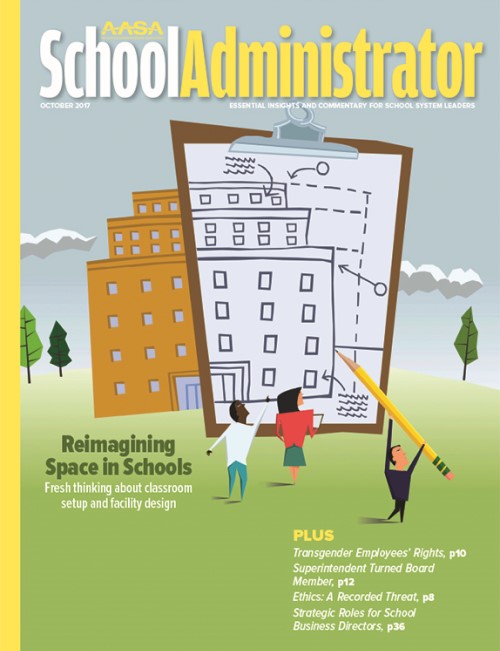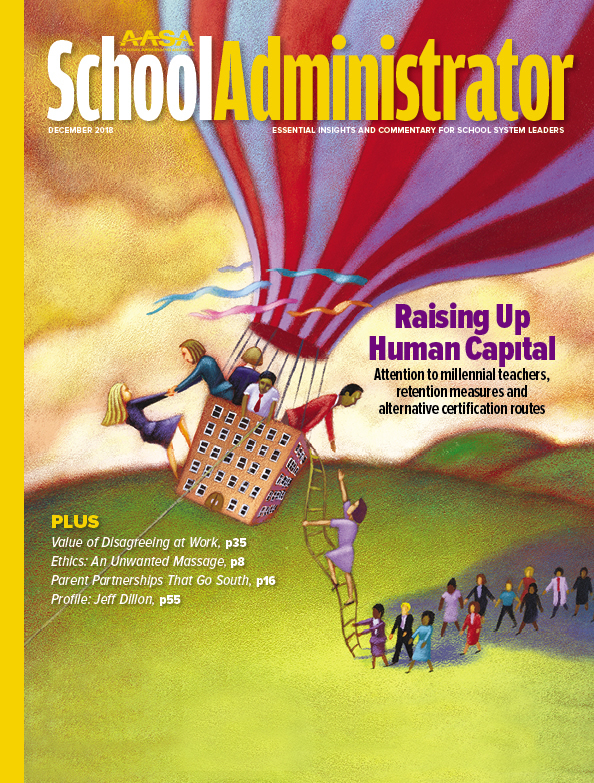2023 Summer Journal of Scholarship and Practice

In this issue, Editor Ken Mitchell writes that “Today’s superintendents and their teams lead in a highly contentious political environment. Survival and success might be better achieved through a deeper understanding of the paradoxes within the conflict and the boundaries that divide.”
He suggests that “unlike any moment in the history of American public education, superintendents have been drawn into a culture war whose battleground … includes local school districts.” He points to the necessity for today’s students to be prepared for “shifting environmental, geo-political, and economic challenges that will require an evidenced-based understanding of the issues and their root causes. Were we to describe this to the students, many would cock their head and say “huh?” But as educational leaders it is up to you, to us, to provide an empirical problem-solving process. Our future citizens will also need to understand historical abuses of power to guard against emerging forms of authoritarianism that today threatens democracy around the globe.” Further he says, “Superintendents cannot lead this important work alone. They need strong teams to support them and school boards that understand and agree to the greater mission with policies to achieve the community’s vision for students.”
But are we in a time and place where this can happen? In many communities and school districts around the country we are not. As Mitchell says, "We are in a moment of confusion as well as conflict.” As school leaders, you are in a time and place that is requiring you take on the task of finding better ways to understand and then help explain to others those boundaries that divide because as Mitchell says, “What some deem as offensive, others argue are essential.”
With this as the backdrop, the first article, written by Nancy Watkins, Allan Mucerino, and Dawn Person, studied the challenges facing school board members and describes a decision-making model driven by value preferences at a time when boards and superintendents are dealing with complex issues.
In the second article, “The Praying Football Coach Supreme Court Decision: Five Implications for School Administrators,” authors Michael Shaffer, Janet Decker, and Jennifer Rippner analyze the constitutional tensions over religious expression in public schools when the Free Exercise Clause conflicts with the Establishment Clause and prior judicial decisions. This piece is particularly enlightening given today’s climate in many school districts.
The third article is written by Lisa Allen, Joseph Wallace, and Franklin Thomas. The authors propose a model that breaks down barriers between P-12 and post-secondary institutions to integrate theory and practice through expertise and resources to provide rich and authentic experiences.
The fourth article is titled “PreK-12 Is the New Reality: How Do We Make It Work?” It is written by Deborah Stipek and Cynthia Coburn and examines the void between stated policy and what is happening in the classroom and identifies five elements that district leaders need to consider in their efforts to support effective instruction. The researchers call for a review and alignment of practices and policies to achieve effectiveness and continuity.
Advertisement
Additional Articles
-
Boundaries, Boards, and Battles
Already contending with the challenges of leading a complex organization, district leaders are now expected to balance this work within a volatile political environment and an urgency to prepare a future citizenry.
-
 School Board Members' Beliefs About State Education Policymaking and Policymakers
School Board Members' Beliefs About State Education Policymaking and PolicymakersThis study's results could provide insights into how school boards serving underrepresented students mobilize to advance their policy goals and exercise their power as policymaking and policy-influencing bodies.
-
 The Praying Football Coach Supreme Court Decision: Five Implications for School Administrators
The Praying Football Coach Supreme Court Decision: Five Implications for School AdministratorsGuidance about how to respond to this seminal case by concluding with five implications of the Court’s decision.
-
Grow Your Own Programs: An Opportunity for Universities and School Districts to Collaborate and Reshape Principal Preparation
This study examines how one private university utilized a Grow Your Own (GYO) concept to provide more authentic field-based cohort learning.
-
 PreK-12 Is the New Reality: How Do We Make It Work?
PreK-12 Is the New Reality: How Do We Make It Work?A framework for ensuring the long-term benefits of investment in preschool and improving student learning in the early grades.
Editorial Board
Editor
Kenneth Mitchell, Manhattanville College
Associate
Editor
Barbara Dean, AASA, The School Superintendents Association
Editorial Review Board
Jessica Anspach, Montclair State University
Brandon Beck, Ossining Public Schools
Michael Cohen, Denver Public Schools
Betty Cox, University of Tennessee, Martin
Vance Dalzin, Carthage College,
Kenosha, WI
Mary Lynne Derrington, University of Tennessee
Ryan Fisk, East Rockaway Public Schools, NY
Denver J. Fowler, Southern Connecticut State University
Daniel Gutmore, Seton Hall University
Gregory Hauser, Roosevelt University, Chicago
Steve
Hernon, St. John’s University
Zach Kelehear, Augusta University, GA
Kevin Majewski, Seton Hall University
Joanne Marien, Manhattanville College
Nelson Maylone, Eastern Michigan University
Robert S. McCord, University of Nevada, Las Vegas, Emeritus
Barbara McKeon, Broome Street Academy Charter High School, New York, NY
Margaret “Terry” Orr, Fordham University
Brian Osborne, Lehigh University
David J. Parks, Virginia Polytechnic Institute and State University
Joseph Phillips,
Manhattanville College
Joseph Ricca, White Plains City School District
Thomas C. Valesky, Florida Gulf Coast University, Emeritus
Charles Wheaton, Leadership Services, Granger,
WA
Additional Resources
- Browse the latest resources on the all new AASA.org
- Access the latest advocacy updates on The Leading Edge Blog
- Read the latest issue of School Administrator magazine
- View upcoming AASA events and programs
Sponsorship and Appreciation
The AASA Journal of Scholarship and Practice would like to thank AASA, The School Superintendents Association, and in particular AASA’s Leadership Network, for its ongoing sponsorship of the journal.
We also offer special thanks to Kenneth Mitchell, Manhattanville College, for his efforts in selecting the articles that comprise this professional education journal and lending sound editorial comments to each volume.
The unique relationship between research and practice is appreciated, recognizing the mutual benefit to those educators who conduct the research and seek out evidence-based practice and those educators whose responsibility it is to carry out the mission of school districts in the education of children.
Without the support of AASA and Kenneth Mitchell, the AASA Journal of Scholarship and Practice would not be possible.
Advertisement
Advertisement



